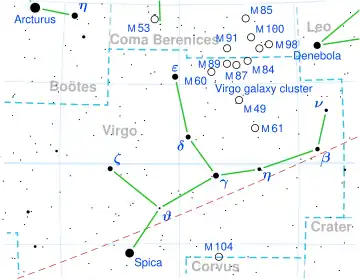Kappa Virginis
Kappa Virginis (κ Virginis, abbreviated Kappa Vir, κ Vir), officially named Kang /ˈkæŋ/,[8] is a solitary star in the zodiac constellation of Virgo. It has an apparent visual magnitude of 4.18,[2] which is sufficiently bright to be seen with the naked eye. Based upon stellar parallax measurements, the distance to this star is about 255 light-years.
 | |
| Observation data Epoch J2000.0 Equinox J2000.0 | |
|---|---|
| Constellation | Virgo |
| Right ascension | 14h 12m 53.74538s[1] |
| Declination | −10° 16′ 25.3340″[1] |
| Apparent magnitude (V) | 4.180[2] |
| Characteristics | |
| Spectral type | K2/3 III[3] |
| U−B color index | +1.457[2] |
| B−V color index | +1.343[2] |
| Astrometry | |
| Radial velocity (Rv) | −4.38±0.21[4] km/s |
| Proper motion (μ) | RA: +7.25[1] mas/yr Dec.: +139.88[1] mas/yr |
| Parallax (π) | 12.80 ± 0.25 mas[1] |
| Distance | 255 ± 5 ly (78 ± 2 pc) |
| Absolute magnitude (MV) | −0.28[5] |
| Details | |
| Mass | 1.46±0.04[6] M☉ |
| Radius | 25.41±0.74[6] R☉ |
| Luminosity | 229[6] L☉ |
| Surface gravity (log g) | 1.83±0.08[6] cgs |
| Temperature | 4,235±20[6] K |
| Metallicity [Fe/H] | −0.43±0.04[6] dex |
| Rotational velocity (v sin i) | 5.1[4] km/s |
| Age | 9.67±0.97[6] Gyr |
| Other designations | |
| Database references | |
| SIMBAD | data |
Nomenclature
κ Virginis (Latinised to Kappa Virginis) is the star's Bayer designation.
In Chinese, 亢宿 (Kàng Xiù), meaning Neck, refers to an asterism consisting of Kappa Virginis, Iota Virginis, Phi Virginis and Lambda Virginis.[9] Consequently, Kappa Virginis itself is known as 亢宿一 (Wěi Xiù yī), "the First Star of Neck".[10]
In 2016, the IAU organized a Working Group on Star Names (WGSN)[11] to catalog and standardize proper names for stars. The WGSN approved the name Kang for this star on 30 June and it is now so included in the List of IAU-approved Star Names.[8]
Properties
This is an orange-hued K-type giant star with a stellar classification of K2/3 III.[3] It has about 146% of the mass of the Sun, but at an estimated age of 9.7 billion years it has evolved and expanded to over 25 times the Sun's radius. As a consequence, it shines with around 229 times the solar luminosity. The effective temperature of the star's outer atmosphere is 4,235 K.[6]
References
- van Leeuwen, F. (2007), "Validation of the new Hipparcos reduction", Astronomy and Astrophysics, 474 (2): 653–664, arXiv:0708.1752, Bibcode:2007A&A...474..653V, doi:10.1051/0004-6361:20078357, S2CID 18759600.
- Jennens, P. A.; Helfer, H. L. (September 1975), "A new photometric metal abundance and luminosity calibration for field G and K giants", Monthly Notices of the Royal Astronomical Society, 172 (3): 667–679, Bibcode:1975MNRAS.172..667J, doi:10.1093/mnras/172.3.667.
- Houk, N.; Swift, C. (1999), "Michigan catalogue of two-dimensional spectral types for the HD Stars", Michigan Spectral Survey, 5, Bibcode:1999MSS...C05....0H.
- Massarotti, Alessandro; et al. (January 2008), "Rotational and radial velocities for a sample of 761 HIPPARCOS giants and the role of binarity", The Astronomical Journal, 135 (1): 209–231, Bibcode:2008AJ....135..209M, doi:10.1088/0004-6256/135/1/209, S2CID 121883397.
- Anderson, E.; Francis, Ch. (2012), "XHIP: An extended hipparcos compilation", Astronomy Letters, 38 (5): 331, arXiv:1108.4971, Bibcode:2012AstL...38..331A, doi:10.1134/S1063773712050015, S2CID 119257644.
- Maldonado, J.; et al. (June 2013), "The metallicity signature of evolved stars with planets", Astronomy & Astrophysics, 554: 18, arXiv:1303.3418, Bibcode:2013A&A...554A..84M, doi:10.1051/0004-6361/201321082, S2CID 119289111, A84.
- "kap Vir". SIMBAD. Centre de données astronomiques de Strasbourg. Retrieved 2016-09-08.
- "Naming Stars". IAU.org. Retrieved 16 December 2017.
- (in Chinese) 中國星座神話, written by 陳久金. Published by 台灣書房出版有限公司, 2005, ISBN 978-986-7332-25-7.
- (in Chinese) 香港太空館 - 研究資源 - 亮星中英對照表 Archived 2008-10-25 at the Wayback Machine, Hong Kong Space Museum. Accessed on line November 23, 2010.
- "IAU Working Group on Star Names (WGSN)". Retrieved 22 May 2016.